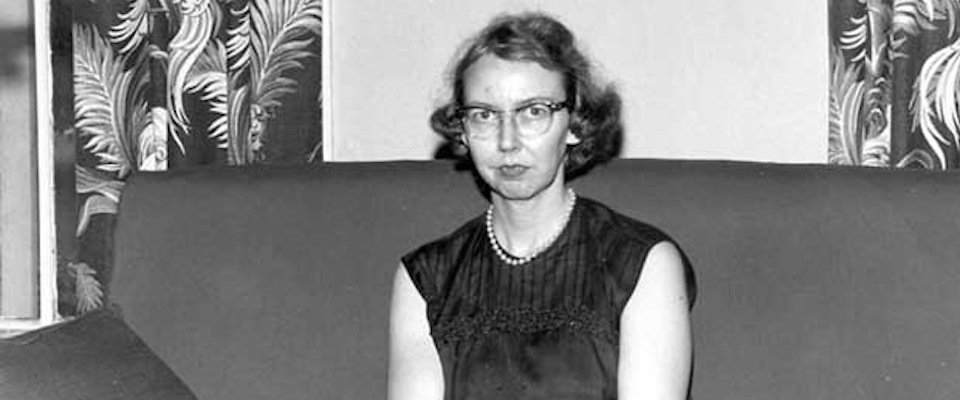I’m reading the splendid collection of Flannery O’Connor’s letters, and the dry wit and sparkling, eccentric intelligence of the woman is refreshing.
Here is a writer with no pretense and no posing. She has fled the New York elitist writer’s colony to live in her mom’s farmhouse in North Georgia. She writes for three hours a day then sits around watching her peacocks, and reads the Summa for an hour before bed every night.
She has one particular correspondent who understands her and it is to this person she confides her thoughts and feelings about her faith.
You are right that I won’t ever be able entirely to understand my own work or even my own motivations. It is first of all a gift, but the direction it has taken has been because of the Church in me or the effect of the Church’s teaching, not because of a personal perception or love of God. For you to think this would be possible because of your ignorance of me, or for me to think it would be sinful in a high degree. I am not a mystic and I do not lead a holy life. Not that I can claim any interesting or pleasurable sins (me sense of the devil is strong) but I know all about the garden variety, pride, gluttony, envy and sloth, and what is more to the point, my virtues are as timid as my vices. I think sin occasionally brings one closer to God, but not habitual sin and not this petty kind that blocks every small good. A working knowledge of the devil can be very well had from resisting him.
However, the individual in the Church is, no matter how worthless himself, a part of the Body of Christ and a participator in the Redemption. There is no blueprint that the Church gives for understanding this. It is a matter of faith and the Church can force no one to believe it. When I ask myself how I know I believe, I have no satisfactory answer at all, no assurance at all, no feeling at all. I can on say with Peter, Lord I believe, help my unbelief. And all I can say about my love of God is, Lord help me in my lack of it. I distrust pious phrases, particularly when they issue from my mouth. I try militantly never to be affected by the pious language of the faithful but it is always coming out when you least expect it. In contrast to the pious language of the faithful the liturgy is beautifully flat.”
This is the sort of spiritual writing that makes me sit up and sing a quiet Alleluia. I rejoice in this because Flannery O’Connor is so ruthlessly honest.
If I am ruthlessly honest, one of the burdens of priesthood is the pretense. Every day one puts on the uniform and plays the part of the priest, but too often it is an act. Yes, yes, we all have to behave ourselves and put on good manners and smile and be polite and try to be good, but the bar is set higher for the Catholic priest. Furthermore, there is a certain type of pew sitter who doesn’t actually want their priest to be real and to be honest. These are the people of the lie and they exert an enormous amount of subtle pressure to get the priest to conform to their image of the priest–a person who supports their own religious fantasy world–a world they have constructed to make themselves into the wonderful people they think they are. BTW, if you are interested in “the people of the lie” the discussion of it makes up a good part of the first half of my book Immortal Combat.
Flannery’s words on faith are as gritty and real as her fiction. She calls herself a “Christian realist”, and as far as I know, that’s about the only label she ever claimed for herself as a writer and a person. What an ambition! To be a Christian realist! To shuck off all the costumes, all the fakery, all the propaganda and posing–to shed all the masks, stop posturing and pretending and have the courage to be who we are not what other people think we are, what other people expect us to be and certainly not to attempt to be the person we think God wants us to be. That is almost always an artificial construct of our own imagination.
To be a saint is to be not what we think God wants us to be, but to be what created us to be–and that is ourselves, not the soiled, broken, petty and self centered self, but the person who has “grown up into the full humanity of Christ Jesus” as St Paul rhapsodizes to the Ephesians.
Flannery got it, and pray God I may get it before it’s too late.







How to do it, though? To get it is easy enough. A sudden insight, borne of an apt description. Even an intellectual and emotional assent, “Yes! Be who God created me to be. Right on!”
But how to do it? Not thirty seconds later my mind has wandered, I am laughing at an off color joke, relieved that a particularly difficult patient will not be coming in on this shift, or annoyed at my daughter for being a five-year-old.
The only answer I have come up with is repentance, prayer, sacraments, try again. Rinse and repeat.
More to the point, my virtues are as timid as my vices.
Q: What do you do in the monastery:
Old Monk: We fall and get up again. We fall and get up again.
Amen! Oops, did I really think that?